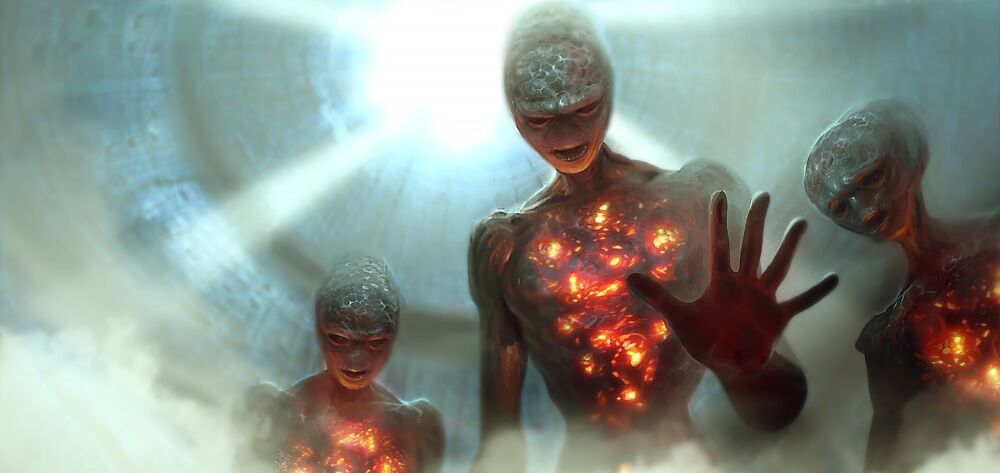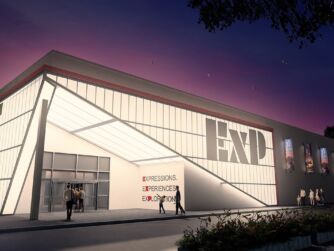 Ariel Arias has been creating futuristic sci-fi worlds since he was 10 years old. For the past 20 years, he’s been writing novels, RPG books, comics, and now he’s making video games and virtual reality experiences.
Ariel Arias has been creating futuristic sci-fi worlds since he was 10 years old. For the past 20 years, he’s been writing novels, RPG books, comics, and now he’s making video games and virtual reality experiences.
The Hum Universe is a first-person horror alien invasion game that has a beautifully crafted world. The first installment of The Hum explores one of Ariel’s childhood phobias of Alien abductions. His Totwise Studios team is using the Unreal Engine 4, and the preliminary gameplay footage looks stunning:
Ariel attempted a Kickstarter for The Hum, and eventually received support from Rothenberg Ventures to be a part of the first class of River’s incubated VR projects.
You can download a proof of concept demo of The Hum from Oculus share, or via their website here.
Here’s a more detailed introduction to the story of the project:
You can find more development updates and videos on the Totwise YouTube channel or on The Hum Universe website.
Become a Patron! Support The Voices of VR Podcast Patreon
Theme music: “Fatality” by Tigoolio
Subscribe to the Voices of VR podcast.
Here’s a playthrough video of The Hum demo by Nathie:
Rough Transcript
[00:00:05.412] Kent Bye: The Voices of VR Podcast.
[00:00:11.921] Ariel Arias: My name is Ariel Arias. I am the CEO and founder of Toddwise Studios, a studio from Argentina making video games and experiences for virtual reality. We started with virtual reality when I saw Oculus Rift for the first time. I was creating a sci-fi universe all my life. I wrote 16 novels, manuscripts. When I tried out Oculus Rift, I instantly knew that I needed to bring this universe as virtual reality experiences. So I dropped my job and I started my own company to make these games. This universe is called the Ham Universe and the first title we are making to introduce people with this universe is called the Ham Abductions and it's pretty oriented and based to the topic of alien abductions and alien invasions.
[00:00:58.093] Kent Bye: So it sounds like you were writing all these novels since you were like 10 years old and then now you're actually bringing a lot of these, you know, stories that you've been imagining to life in VR. So talk a bit about that process of having ideas of a narrative and a story and then actually experiencing them in VR.
[00:01:15.630] Ariel Arias: Well all my life when I was creating this universe I felt that something was missing to share a complete experience to the people. Read and to watch movies are great and you can be immersive and that but they are not enough. So I was waiting on my life for virtual reality and when I tried it and instantly started working on DK1 It was an interesting process because the way of narrative is so new, so unexplored. There are uncharted oceans to navigate, to discover new ways of gameplay, of storytelling, but it's super exciting. I found it super exciting. I definitely will keep working for virtual reality. And it's not that hard as that many people can believe. Because if you have a good background with gaming and with media production, you can figure out at least a base to create your own content. But the exciting part is that it's that new that the potential of virtual reality is not only to bring what we already have to virtual reality. It's to create new ways of storytelling, of interaction, and even to interact with the life. And that's amazing.
[00:02:34.413] Kent Bye: And so what is part of your intention of giving someone the experience of having an alien abduction? What do you want people to get out of these types of experiences?
[00:02:45.225] Ariel Arias: Actually, when I was a teenager, I had a great phobia to the aliens. I couldn't sleep in the night because I always thought that aliens were abducting me. And at the same time, apparently, I was creating this universe. So when I wanted to start with this, I am a therapist too, not only a game developer. So I'm very interested on how the human mind works. And I think aliens are a great topic about that because it's like the fear to the unknown, the real fear to the unknown, but are not like the ghost, because the ghosts are super paranormal. Aliens are a little more tangible. So if you contact with that fear to the unknown, I think that you can explore more possibilities in your mind. And I think if you contact with that, but inside virtual reality is a lot more powerful. So I hope I will not traumatize many people, but I wanted to bring to the people something like a question about our own nature. I think Virtual Reality is amazing for that.
[00:03:49.557] Kent Bye: Nice. And so talk a bit about being a part of the River Accelerator. What's that been like to have this video game startup as part of this incubator that's been happening here at Rothenburg Ventures?
[00:04:01.820] Ariel Arias: Rothenburg was maybe the better thing could happen to us in the last months. I started working alone on this project. Then I started growing a small team. but as independent we are, funding is always a problem, make contact is always a problem, but they selected us, thanks fully for this river program and thanks to them we could get in contact with great people and to be even in events like this one, like this VBR, I think it's the better could happen to us. I'm pretty happy for that and I think that right now we have more door open for continue And they are really visionary, I think, because not many incubators are accepting virtual reality works. But I think that is the future. I think that in maybe some month or maybe one year, many other accelerators will take the same way.
[00:04:53.798] Kent Bye: And so, what were some of the challenges that you faced in terms of bringing this level of vision and kind of fantasy world and making that a reality in VR?
[00:05:02.438] Ariel Arias: There are actually many. One of the most important is input for gameplay. There is no standard for input, so you have a standard for input for classical games like gamepad or mouse or keyboard, but for virtual reality is still the input in too early stage. And if you want to make a really immersive experience with interaction, you need a really good input and that's a problem right now. I think that stuff like Vive or Moves for PlayStation are pretty good stuff, but they are incomplete in my opinion yet. But I think the biggest challenge, at least for games, is input. We are working a lot on that.
[00:05:45.477] Kent Bye: Are you the artist as well or talk a bit about your pipeline in terms of like actually creating the art that's inside of these experiences?
[00:05:52.340] Ariel Arias: Well, I started programming and making the art and everything but right now I have an art director and a small team of artists which is what is growing up and a small team of programmers too and hopefully we will keep growing up, but I think that everybody in the team when they are joined to us, need to make a training to understand how works virtual reality. Because the art is pretty similar to 3D games or 3D movies, but you need to tune up a lot of stuff because it's not the same to have a flat screen and a 3D experience immersive like virtual reality.
[00:06:32.487] Kent Bye: And what type of experiences do you want to have in VR?
[00:06:35.728] Ariel Arias: everything. I think that Dior is capable of anything and I'm so excited thinking on all the possibilities. As I said, I am a therapist too and I think that you can do, I don't know what is the top, I think it's unlimited. I'm pretty excited in thinking on what kind of experience can surprise me in the future. That's why I'm here. I want to look what the people is doing. And I think that in a couple of months as far, we will see amazing stuff and explore the stuff today. Awesome.
[00:07:09.299] Kent Bye: Well, is there anything else that's left unsaid that you'd like to say?
[00:07:11.801] Ariel Arias: Please visit thehamuniversity.com. Thank you very much for the interview.
[00:07:16.845] Kent Bye: OK, great. Yeah, thank you. Thank you. And thank you for listening. If you'd like to support the Voices of VR podcast, then please consider becoming a patron at patreon.com slash voicesofvr.




